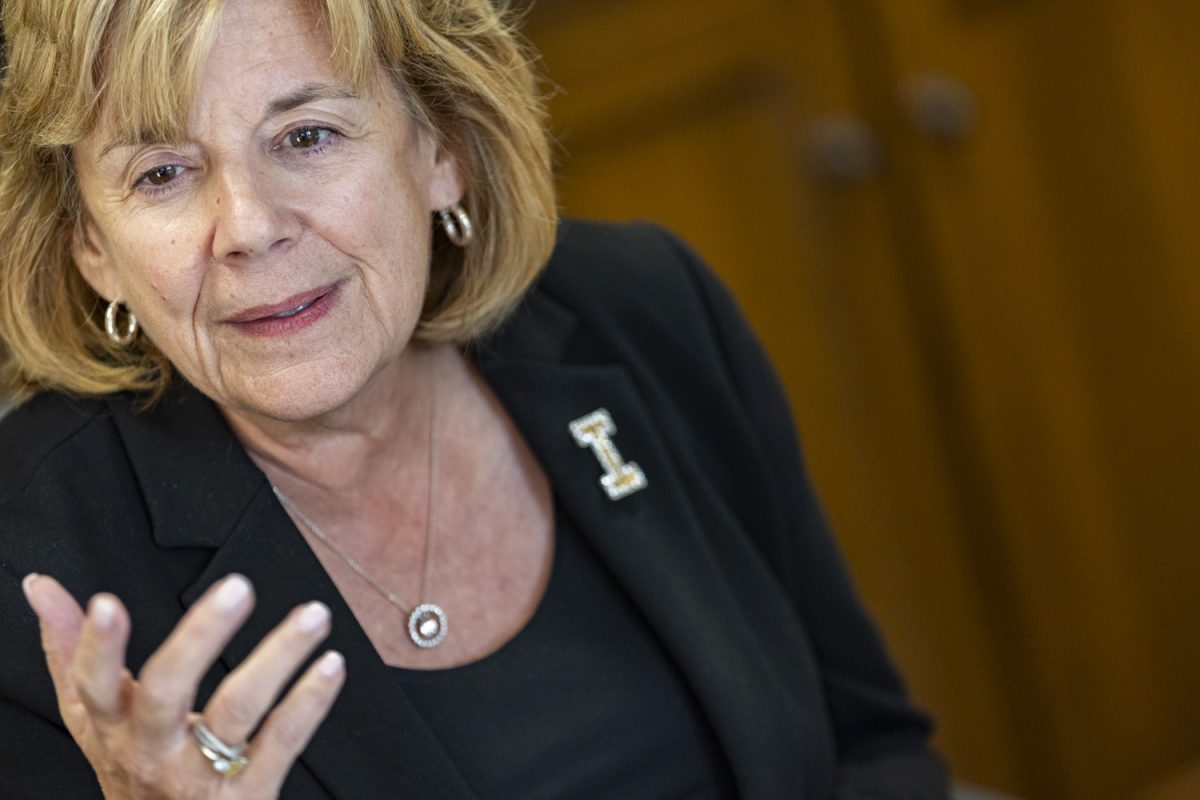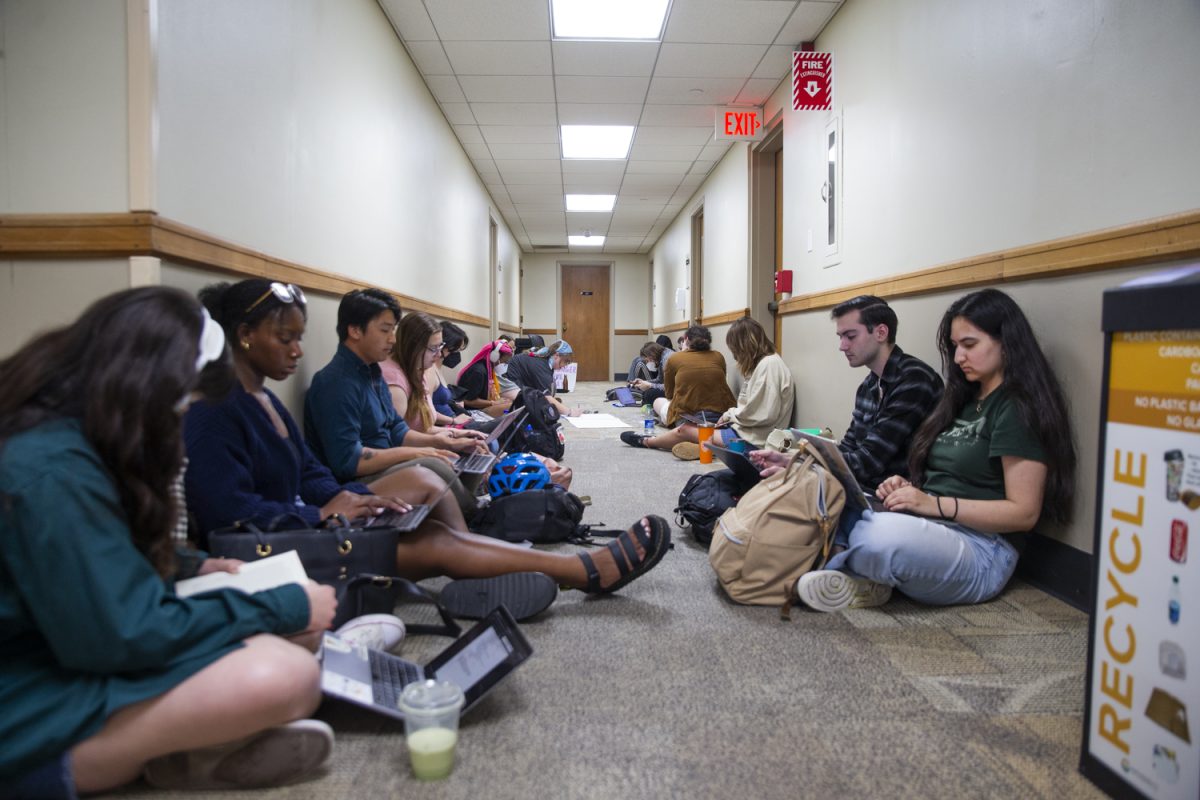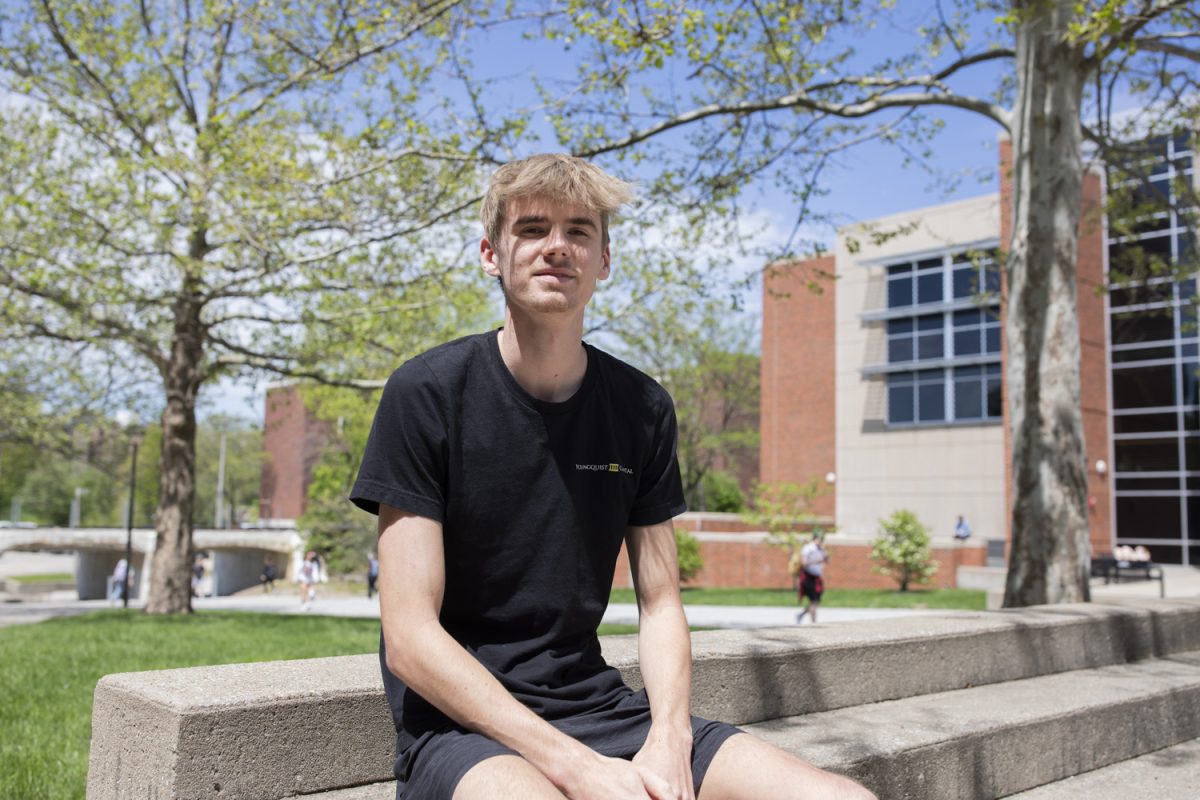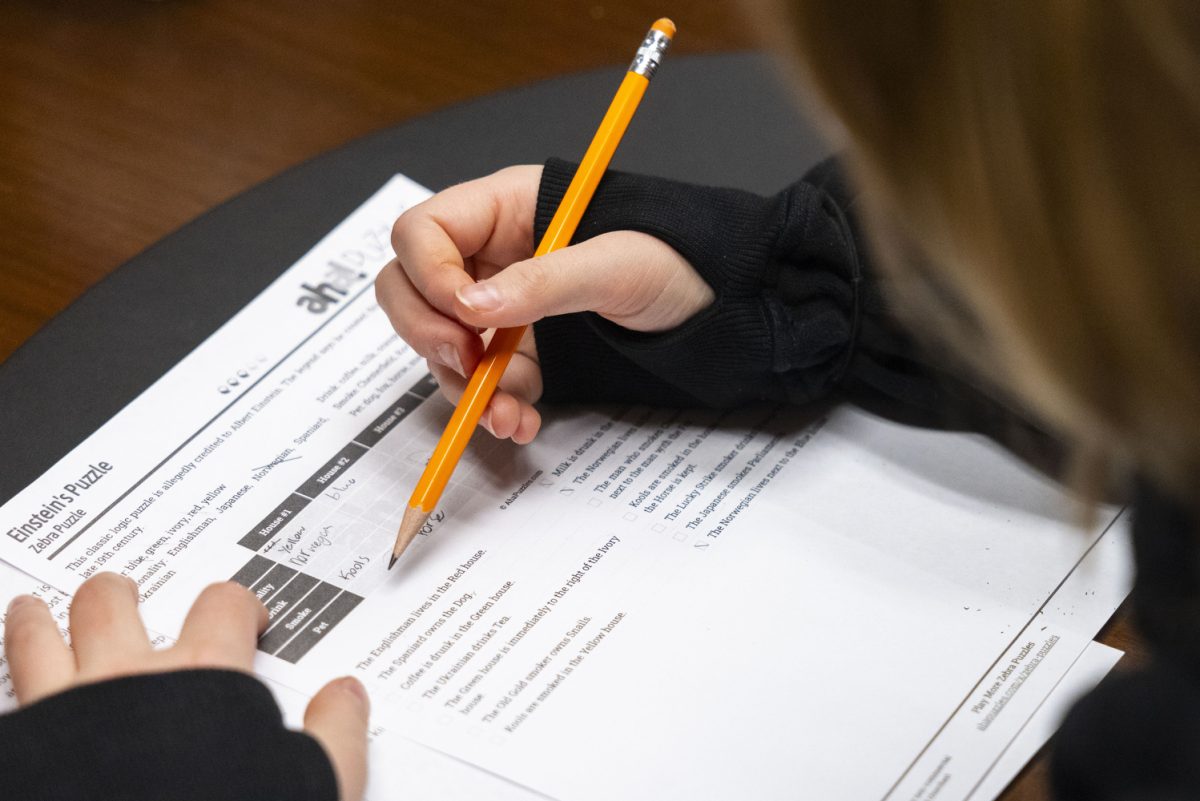The Daily Iowan sat down with the University of Iowa President Barbara Wilson Tuesday to talk about Crossover at Kinnick, college rankings, and Mercy Iowa City appropriations. The interview has been edited for length and clarity.
Wilson: Well, let me start with a couple of opening remarks. First of all, today’s a pretty historic day. Hopefully, you got a sense of how important it is that we are publicly launching the largest, most ambitious campaign in the state of Iowa.
It has three numbers associated with the three different goals, two of which involve engagement. So a lot of times when people talk about fundraising they think only about dollars, which is certainly part of a campaign but we’re one of the only we think public institutions that has actually been bold enough to lay out engagement goals, which refer to how many people we’re going to connect with during this campaign. So the numbers are a little tricky, but the 300,000 is unique alums fans and donors that will connect with 300,000 individuals, tracking every type of engagement so that a single donor might do five different things like mentor donate, come to campus for an event so that would be three but one donor, so it’s 300,000 unique donors, but $3 million contact points. Okay, so three, three, and then $3 billion.
In that vein, do you think that the support that was shown at Kinnick Stadium this weekend will continue into the women’s basketball season overall?
I think it will actually. Season tickets are sold out and that was Coach Bluder’s goal to be the first time ever that we sell out every season ticket and we have so that’s I think a big statement.
Now, we can’t fit 55,000 People in Carver so we won’t see that. But what we have seen is a tremendous interest in supporting the team in the regular season. I think we’re going to be challenged because people are going to want more seats in there. So we’re going to have to look at the capacity and Carver I think over time but right now I think it will continue.
We see just tremendous interest in the women’s basketball team and it’s you know, Caitlin is wonderful, she’s amazing. And people are interested in the whole team. It’s really what they represent and how they work together. The kind of commitment they’ve made to Iowa, and just the amazing things they do on the court and off the court. They are in the community, helping build housing and doing all kinds of other things. They are really great role models for all students.
Do you think the trend of that support for women’s basketball will spread to other women’s sports?
That is the goal. I heard so many people say to me, I never followed women’s sports. I’m not even a women’s basketball fan, and now I’m watching every game.
Will it transfer to other women’s sports?
We’re hoping and we are getting more and more interest in women’s sports about volleyball and soccer as well as the field hockey team that’s doing amazing things.
So I think it will help all women’s sports, but it’s going to be up to us to keep talking about all the teams and celebrating what they do.
Where did the idea come from for this afternoon’s campaign?
I think it’s been a big team effort. We have a whole bunch of people over in the Center for Advancement, the fundraiser, and folks who are planning campaigns.
But then all the deans have been involved. Our shared governance groups have been talking to us about things that matter to them.
I don’t think it’s any one person. It’s really a collective and it’s over the course of the last couple of years as we’ve been planning this quietly. I would say as many people as we can involve, we’ve been doing it.
What is the overall reason for making sure we have enough money to do the things that students are asking for besides hoping to lower tuition and create more opportunities?
In my remarks today I said that the campaign funding will not replace state appropriations and it’s not intended to replace tuition. Every university that I know of is raising money. We have been for decades. So we’re not doing anything out of the ordinary right now. But the goals that you set and the timing of campaigns differ depending on your number of alumni, the passion that they have their willingness to donate, and where they feel the needs are most acute if you will.
This is a pretty ambitious campaign to go out and say we’re going to raise $3 billion. There aren’t very many public institutions that have goals like that. Privates are different. They’ve been in the fundraising business for a long time, and they don’t receive any state support. So this has been their path for a long time, but publics are — we have more varied sources of revenue, and we haven’t been in the businesses as aggressively as we are these days, but this is an aggressive campaign.
I just want to underscore that a lot of people are going to be working really hard and talking to a lot of our donors and friends. The good news is people love Iowa, and people love the Hawkeyes and our alums are intensely loyal, for the most part, they had a great experience here and what they want to do is ensure that the next generation of students has the same kind of experience that they’ve had and that we have the best faculty to make sure that that happens, and that we’ve got great patient care, a great hospital and amazing researchers that are going to cure all kinds of diseases.
So they’re invested. Some of them are a lump sum are grateful patients who have said you have made a difference in my family. I wouldn’t be here if it weren’t for this hospital or this faculty member. I want to make sure that I give to the future of a scientific innovation around health care.
Last week at Faculty Council, Dean Sanders from the College of Liberal Arts and Sciences said the college is in a $24 million deficit and is $10 million short annually. What are your thoughts on this and how is it going to affect the college in the long run?
Yeah, well, we’re working really closely with CLAS right now. And you know, it’s our biggest college. It’s the workhorse college of the campus. We can’t let CLAS struggle, so they’ve agreed that they probably need to look a little bit at their costs and their hiring practices.
We’ve agreed that we need to adjust some of our revenues to ensure that we support them so we’re not expecting an immediate change in their budget. But over the next five years, we’re going to make sure that they get on stronger foot, stronger footing in terms of their revenues and expenditures.
It’s really the fundamentals of much of what we do on the undergraduate education side. And we have to make sure that they’ve got the resources to do what they do best for students.
Beth Goetz became the interim athletic director this June and will be through at least early 2024. What are your thoughts on interim director Goetz becoming athletic director?
I can say she’s been terrific. She has hit the ground running as interim athletic director and I told her when she took this position, to ignore the interim and do the job, and she has done that.
She’s out and about connecting with community members. She’s giving talks and representing us at the national and at the Big Ten level. She’s getting out and about and working with all the coaches. So she’s doing a great job, and I’m getting a lot of positive feedback about her.
We’re not going to do a search right now. We’ve got a lot of searches going on, and we’re kind of positioning them in ways that make sense for us. But I very much hope she will apply, and she’s told me she’s interested.
Following the loss of the sale of Mercy Hospital, how close was UIHC to acquiring Mercy?
We went as high as $28 million. We also committed over $20 million to salaries and rights and health care benefits as well as committing to doing some facility upgrades. So we were in it, you know, pretty aggressively in the end.
We didn’t get the final selection by Mercy and that happens in these situations. We are privy to the decision-making criteria that were used by Mercy Iowa City.
We were thoughtful and we looked carefully at what would be needed to ensure that it would be a great community hospital going forward. It didn’t work and we were disappointed but we’re glad that it’s going to stay hospital. That’s the most important thing for us all along it was how do we support community health care because we can’t take everybody over at that hospital. That has been the challenge for a long time, and we are stretched to the limit over there.
With the announcement of the North Liberty Hospital taking some of the UIHC patients, how does that decision impact the interest this time around with Mercy Iowa City?
It’s just hard to understand the way health care is organized, but there’s only going to be about 35 beds out of North Liberty it’s mostly orthopedic clinical practice and outpatient surgery.
It’s going to be great for the community, but it’s not going to be a full-service hospital with all the aspects of health care. We’re still going to be challenged and we’re still going to need to figure out the bed situation over time.
How do you think the state Board of Regent’s decision to pass $1 million more for mental health will benefit UI students? Of course, pending approval by the Iowa Legislature.
Well, I’m really pleased that the regents added that $1 million for mental health if approved. It came out of their breakfast with student leaders and people should understand the regents are listening to students and those breakfasts are really important before the meetings.
I think Regent Crowe, our student regent gets a lot of credit for that as well. She’s been pretty consistently reminding our regents of student needs and she does a great job at it. I’m optimistic but I’m always optimistic until they tell us “No, we’re not going to fund it.”
But I think it sends a really good consistent message to the legislators that we are working really hard on mental health and wellness, and if they can help us, we can do even more so.
Are there any specific programs that you want to see out of this funding?
Not at this point. We will work with our mental health collaborative who are working every week or two on what we need to do to support mental health needs beyond what is already being done.
We’re also talking to donors about mental health. That’s one of the initiatives many of our donors care about
At some point, we may be able to get a mental health professional in most of the residence halls, which would be fantastic. We’ve got one or two now we probably would love to have more so I mean, there’s a lot of those kinds of initiatives, but I don’t think we’re going to plan on how to spend the money until we have it.
About a month ago the U.S. News and World Report Rankings came out for all colleges and the UI dropped in its overall ranking and its creative writing ranking. What was your reaction to those rankings dropping?
Well, the rankings are a business, and they are operated by a media company that is free to change the formulas frequently. We haven’t dropped in quality. We are the same university we were last year — the formula has changed.
I just have to remind people who get a little anxious about the rankings because it’s a business and we don’t have any control over what weights get assigned to what. This year, there were some pretty dramatic changes in the formula.
So one area where we did really well was class size, we offer more, a higher proportion of classes that are considered small, which is good for students, and they dropped that completely from the rankings. Just decided in one year gone. I think it’s a measure of quality and student experience.
We are still the same great university we were last year. So are we disappointed? Well, I would be more disappointed if I thought students were hanging on every ranking to make decisions about where to go. But there was recently a study released a national study that showed that only about 58 percent of high schoolers said they use rankings to make decisions about where to go to college. And then among those very few could even recall what the ranking of the institution is that they chose to go to.
I think you all know you probably didn’t make your decisions based. We’re still the same university we were last year. So we’ll continue to do what we need to do to ensure that we’re an exceptional place. Now on the writing, though, I will brag about that for a moment because that ranking is really reputational only there are no metrics associated with it. Of the fact that we’re the only public in the top 10 is phenomenal.
If you look at the top 10, it’s mostly Ivy schools, small schools with a lot of resources. And there’s the University of Iowa, the only one in the top 10. We’re the only one in the top 20 by the way.
I’m going to brag about that because it’s based on the perceptions across the country of presidents and provosts of our other institutions saying which universities excel at writing across the disciplines. Look at the list. We’re the only public on the list. Did we drop a little bit? Yeah, but we’re still tied with Yale. We’re still the only public in the top 10. So we’re No.1 public in writing across the disciplines. it’s based on perceptions. The formula didn’t change from one year to another. And we are rocking it on that front.
You all I mean, we have a writing center and Tippie we’ve got one in class, we’ve got one in engineering. The Law School calls itself the writing university. So there isn’t another public university that you can come to, where we’re going to say over and over again. We’re going to hone your communication and your writing skills no matter what you study, and that will be your path to leadership. So sorry, I get a little excited about that with my background and communication.
Chloe Cole and Matt Walsh have come to the university to speak. In keeping those two instances in mind, of speakers on campus who were met with protests and pushback against conservative students. How are Iowa administrators planning to address these concerns?
It’s good for people to voice their concerns and here is what I am proud of. We managed to bring in some controversial speakers and we managed to pull off events that were not interrupted, and we’re allowed to go forward in spite of the fact that in some cases, the speakers prompted a lot of concerns from students.
We’re protecting the First Amendment, and you know how important that is. People want to support the First Amendment until they don’t like what they’re hearing and then all of a sudden, they want us to squash people’s ideas and thoughts.
We are a public university with all kinds of attitudes perspectives and thoughts here. If a student group wants to bring a speaker in and it fits our time, place and manner, obligations, we’re going to do that and we’re going to hopefully manage to allow it to happen to support the First Amendment freedoms of different groups.
That doesn’t mean we agree with all the speakers. No, does it mean that some students are going to be really angry? It can happen, but students could protest and that’s what you saw happen in both cases.
I’m proud that we managed to pull this off without any violence. I’m sorry, I don’t think we had violence. We did have some marbles in one case and a fire alarm and those students were disciplined. In this case, we had a little bit of traffic, and stalling last night, but for the most part, the event went off the way it was planned.
And you know, that’s what we’re all about. We’re about free inquiry and First Amendment rights of students, faculty, and staff. So it’s hard for students to understand that sometimes, but you know, that’s what a big university is about. It’s about differences. And I guess the thing that’s, for me, I hope people are learning through all of this, opening their minds, opening their hearts, listening and learning.
I talked to several students last night after the event, who had been in the back of the room, and one of them said I didn’t agree with her, but I was there to hear what she had to say. And that to me, I was like, if I could give you an A plus for First Amendment and for understanding your rights and responsibilities as a citizen of this country, and as a great educated member of our campus, you got the A+ plus, you know, so it’s hard though. It’s some of these ideas are they feel hurtful, and I get that, but that’s the nature of the First Amendment as we protect people’s rights to speak openly, and you don’t have to agree with it.
But what do you do if you don’t like speech, you do more speech, you know, or you find alternative activities to support the idea you do care about? That’s a more powerful lesson. What if nobody shows up to some of these talks because everybody’s supporting something else? That would be a powerful lesson.
I think we’ve got to figure out how to talk with one another across these terrains and if Hawkeyes can’t do it, who can? You know, that’s been my big thing.
This is a place with a lot of people coming from a lot of different backgrounds and helps us work with our students to understand that our goal really is to open our hearts and minds and learn and listen.










